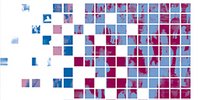| Liebe Leser*innen, in diesen bedrückenden Zeiten fällt es schwer, zum Alltagsgeschäft überzugehen. Wir hoffen dennoch, dass der vorliegende Newsletter ein kleines Stück "Normalität" erzeugt und informieren Sie hiermit über die März-Highlights rund um GESIS. Bleiben Sie gesund! Ihre Redaktion
| Events Dem GESIS Training Team liegt sehr viel an der Gesundheit seiner Teilnehmer*innen und Dozent*innen. Aus diesem Grund haben wir alle Veranstaltung abgesagt, die bis einschließlich 19. April 2020 stattfinden sollten.
The GESIS Training Team is very concerned about the health of its participants and lecturers. For this reason we have cancelled all events that were supposed to take place up to and including 19 April 2020. Get further information | Dear readers, in these difficult times, it's hard to make the transition to everyday business. Nevertheless, we hope that this newsletter will create a little bit of "normality" and hereby inform you about the March highlights around GESIS. Stay safe! Your editorial staff | Call for Submissions Collect Survey Data on the Coronavirus (SARS-CoV-2) Outbreak in Germany The GESIS Panel offers researchers the opportunity to collect survey data on the current outbreak of the Coronavirus (SARS-CoV-2) in Germany via a fast-track procedure. Further information |
 | Erweiterte Suche in ZIS – jetzt mit Items und Skalen aus dem FDZ Bildung Mit dem etablierten Open-Access-Angebot ZIS stellt GESIS Wissenschaftler*innen diese validierten Erhebungsinstrumente für nichtkommerzielle Forschungszwecke zur Verfügung. Ab sofort können Forschende über die ZIS-Suche noch zusätzliche Messinstrumente abrufen: Durch eine Kooperation mit dem Forschungsdatenzentrum (FDZ) Bildung am DIPF | Leibniz-Institut für Bildungsforschung und Bildungsinformation können Wissenschaftler*innen künftig auch auf ein breiteres Repertoire an Erhebungsinstrumenten für die Bildungsforschung zugreifen. Mehr lesen...
Advanced search in ZIS - now with items and scales from Research Data Center (FDZ) for Education Researchers can now access additional survey instruments via the ZIS search: Thanks to a cooperation with the Research Data Center (FDZ) for Education at the DIPF | Leibniz Institute for Research and Information in Education, researchers can now access a broader repertoire of survey instruments for educational research. Read more... |
 | HSR 45 (2020) 1 - Special Issue „Emotion, Authority, and National Character" erschienen Special Issue – Emotion, Authority, and National Character: Historical-Processual Perspectives (Helmut Kuzmics, Dieter Reicher & Jason Hughes) Die wiedererstarkte Bedeutung des Nationalstaates, das Aufkommen nationalistischer Parteien und Debatten über "nationale Identität" prägen die aktuelle politische und gesellschaftliche Landschaft. Die für das neue Sonderheft " Emotion, Authority, and National Character" verfassten Beiträge beleuchten diese Entwicklungen mit Blick auf historische Langzeitprozesse. Mehr lesen...
HSR 45 (2020) 1 has been published: Special Issue „Emotion, Authority, and National Character" Special Issue – Emotion, Authority, and National Character: Historical-Processual Perspectives (Helmut Kuzmics, Dieter Reicher & Jason Hughes) A renewed significance of the nation state, the rise of nationalist parties and debates about “national identity” shape the current political and societal landscape. The papers written for the new Special Issue „Emotion, Authority, and National Character" suggest focusing on historical long-term processes and on the various relationships between the formation of “survival units” (Elias) like states and the make-up of the personality structure of its members in different nation-states. Read more... |
 | Pretestbericht „Demographische Standards“ in der Pretest-Datenbank veröffentlicht Pretestbericht "Demographische Standards" (doi.org/10.17173/pretest75) Die demographischen Standards dienen der Vereinheitlichung der Erhebungsinstrumente sozio-demographischer Merkmale von Befragten in Umfragen. Die erfassten Merkmale reichen von standardmäßig erhobenen Konzepten wie Alter und Geschlecht über Fragen zur Staatsangehörigkeit und Familienstand, Schul- und Berufsabschluss bis hin zum Erwerbsstatus. Das GESIS-Pretestlabor hat einen kognitiven Pretest zu den demographischen Standards durchgeführt. Mehr lesen...
Pretest report „Demographische Standards“ has been published Pretestbericht "Demographische Standards" (doi.org/10.17173/pretest75) [only in German] The demographic standards are important for the standardization and harmonization of socio-structural variables as survey instruments of socio-demographic characteristics of respondents in surveys. The characteristics covered range from standard survey concepts such as age and gender to questions on nationality and marital status, school and vocational qualifications and employment status. . Read more... |
 | Evaluationsergebnisse für Twinning veröffentlicht Die Evaluationsergebnisse für Twinning (H2020-WIDESPREAD-05-2020) berücksichtigen zahlreiche Forschungseinrichtungen aus Deutschland. GESIS - Leibniz-Institut für Sozialwissenschaften gehört zu den Begünstigten. Mehr lesen...
Evaluation results for Twinning published The results of the evaluation for Twinning (H2020-WIDESPREAD-05-2020) take into account numerous research institutions from Germany. GESIS - Leibniz Institute for the Social Sciences is one of the beneficiaries. Read more... |
 | Neue Publikation erschienen: Ethnic and Social Class Discrimination in Education Wenz, S. E., & Hoenig, K. (2020). Ethnic and Social Class Discrimination in Education: Experimental Evidence from Germany. Research in Social Stratification and Mobility, Online first. https://doi.org/10.1016/j.rssm.2019.100461 Die Autor*innen untersuchen ethnische und soziale Diskriminierung im deutschen Bildungssystem anhand einer Zufallsstichprobe von Grundschullehrkäften, die einen kurzen Aufsatz eines Viertklässlers lesen und bewerten. Mehr lesen...
New publication available: Ethnic and Social Class Discrimination in Education Wenz, S. E., & Hoenig, K. (2020). Ethnic and Social Class Discrimination in Education: Experimental Evidence from Germany. Research in Social Stratification and Mobility, Online first. https://doi.org/10.1016/j.rssm.2019.100461 The authors asked randomly sampled elementary school teachers who teach immigrants to evaluate an essay written by a fourth-grader. Read more... |
Folgen Sie uns/ Follow us!
|

